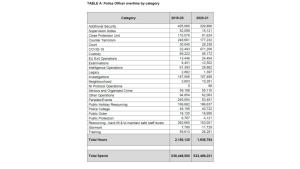Question
I understand overtime costs for the last two years were £33m in 2020/2021 and £37m in 2019/2020. Can I ask the Chief Constable for a breakdown and what plans, if any, are in hand to lower the figures
Answer
1. Breakdown of Police Officer overtime by category
Costs related to police officer overtime are coded against a range of categories reflecting the underlying demand. Some overtime is pre-planned, for example, overtime to facilitate training outside of regular hours or backfill to cover for known sick absence. Other overtime is very much reactive to events such as responding to a murder or being required to attend Court or to preserve evidence at a scene for example.
Table A below provides a summary of police officer overtime by category and in hours (as this reflects how operational activity is managed) for both 2019-20 and 2020-21. The total financial cost is also provided.
2. Management of Overtime
The table also demonstrates that the cost of overtime was significantly reduced from 2019-20 into 2020-21. It is recognised that this is a difficult area of expenditure to control and that further reductions would be beneficial.
The Deputy Chief Constable has developed an Overtime Strategy and chairs an Overtime Steering Group to continually monitor and assess the use of overtime at an organisational level.
Although the Overtime budget is devolved to each Assistant Chief Constable/Assistant Chief Officer to manage on a day to day basis, the Overtime Steering Group meets monthly to discuss overtime spend and anticipated future demands. Each of the main spending areas for overtime (District Policing, Crime and Operational Support) also have local Overtime Reduction Plans which set out their strategy for reducing overtime spend.
Covid-19 has caused an increase in our use of overtime due to operational necessity around changes to shift patterns and ‘bubbling’. Overtime used in this area will reduce going forward, however, a return to a more normal post-pandemic society will also result in inevitable increases in the number of events, many of which will require some use of overtime in the interests of public safety.
We are committed to maintaining a downward pressure on the Overtime Budget and maximising the impact on the use of resources. Future plans will involve a review of shift patterns and working practices to further reduce the demand for overtime working. This would not only contribute to reduced financial costs but also to the improved wellbeing of our officers.

Mike Nesbitt - UUP